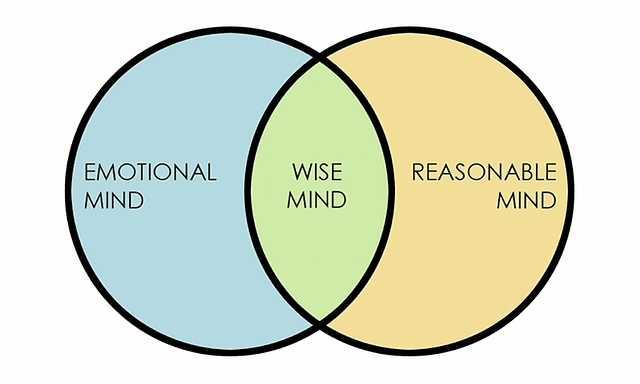Physician Information
DBT Opportunities for your Patients in Saskatchewan
Comprehensive DBT
STG Health Services Inc. provides comprehensive DBT services to patients with Borderline Personality Disorder (BPD) or Bipolar Disorder 1 & 2 (BD), as well as patients who have symptoms of BPD or BP but have not met the diagnostic criteria.
For patients diagnosed with Borderline Personality Disorder who require one-on-one comprehensive counselling.
For patients diagnosed with Borderline Personality Disorder who have never taken DBT Skills Training before.
For patients diagnosed with Borderline Personality Disorder who have completed DBT Skills Basics Training at least once.
For patients diagnosed with Bipolar Disorder 1 or 2.
This program is highly tailed to the experiences of the individual, and therefore not described below. More information can be found on the page dedicated to DBT-PE.


Individual one-on-one
DBT Counselling
Individual counselling in DBT usually involves weekly one-on-one sessions with a trained therapist. These sessions are designed to address the unique challenges each patient faces in their daily life, and they’re tailored to meet the specific needs and goals of the individual. Individual counselling provides personalized support and guidance to help patients make positive life changes.
- Dedicated DBT Therapist
- Inbetween Session Supports (secure messaging)
- Therapy Coordination with Physicians
- NIHB funding for First Nation Clients*
- Métis Nation Saskatchewan Citizen Funding*
- Ongoing Intake
* Funding is client-specific and depends on approval by NIHB or Métis Nation Saskatchewan.
Patient Registration
Patients can self-register on this website. Once the registration is processed, patients must complete a short BPD or BD symptom screening, a consent form, and an intake form. Once these have been received, an individual intake appointment will be scheduled to discuss the suitability of starting individual counselling as an outpatient.
Request Intake AppointmentProgram
The therapist and the patient work closely to identify and explore the thoughts, emotions, and behaviours that contribute to the patient’s struggles. One of the core principles of DBT is the idea of “dialectics,” which involves balancing acceptance and change. The therapist will help patients accept their emotions and experiences while working on strategies to change unhealthy behaviour patterns.
Treatment Duration
Patients with DBT generally receive individual counselling concurrently with DBT Skills group counselling. Many BPD and BD patients continue with individual counselling after completing DBT Skills Basics. Typically, patients receive a minimum of 24 weeks of therapy.
Inbetween Session Supports
All patients have access to the online Secure Messaging support system. They can ask questions, as well as access additional resources on request. In addition, the therapist can request that patients complete screenings when certain symptoms seem to increase.
Group counselling
DBT SKILLS BASICS
DBT Skill Training is a transformative approach for individuals with borderline personality disorder or bipolar disorder, offering numerous benefits that can lead to a more stable, fulfilling life. DBT skill training empowers clients to take control of their lives and overcome the challenges associated with BPD or BD by teaching practical tools and techniques for managing emotions, improving relationships, and coping with distress. With its structured, goal-oriented approach and emphasis on self-awareness, DBT skill training is invaluable for those seeking lasting change and emotional healing.
- 24 Weekly Online Group Sessions (Wednesdays)
- Online Community Peer Support
- Therapy Coordination with Physicians
- NIHB funding for First Nation Clients*
- Métis Nation Saskatchewan Citizen Funding*
- Next Start Date: September 2023
* Funding is client-specific and depends on approval by NIHB or Métis Nation Saskatchewan.
Patient Registration
Patients can self-register on this website. Once the registration is processed, patients must complete a short BPD or BD symptom screening, a consent form, and an intake form. Once these have been received, an individual intake appointment will be scheduled to discuss the suitability of joining the program.
Request IntakeProgram Description
DBT Skills Training is facilitated by a skilled therapist, much like an online class. The participants are given assignments to work on between these sessions. This training aims to equip individuals with practical, real-world skills that they can apply in times of distress, thus replacing harmful and negative behaviours. The group typically meets once every week for one and a half to two hours. The entire course content takes around 24 weeks to cover.
Skill Development
This pertains to the conscious effort of grounding oneself in the present moment, recognizing and accepting thoughts, emotions, and actions as they occur, without any endeavor to modify them.
This involves mastering strategies to deal with crises, particularly when the circumstances are immutable, and acknowledging the reality of the situation rather than how one might wish it to be.
This refers to the ability to modulate one's emotions in such a manner that they do not dominate one's thoughts and behaviors.
This relates to the capacity to articulate personal needs or decline requests when needed, while simultaneously preserving one's self-esteem and interpersonal relationships.
Group counselling
DBT SKILLS ADVANCED
DBT Advanced Skill Training is an intensive program designed for individuals who have completed the initial stages of DBT and seek to further develop their skills for more complex and challenging situations. The main objective of this advanced training is to help clients continue their progress toward a more stable and fulfilling life by mastering advanced techniques for managing emotions, improving interpersonal relationships, and reducing self-destructive behaviours.
- 13 Weekly Online Group Sessions (Wednesdays)
- Online Community Peer Support
- Therapy Coordination with Physicians
- NIHB funding for First Nation Clients*
- Métis Nation Saskatchewan Citizen Funding*
- Next Start Date: September 2023
* Funding is client-specific and depends on approval by NIHB or Métis Nation Saskatchewan.
Participation Requirement
For patients to participate in the DBT Skills Advanced, they must have completed the DBT Skills Basics with us or at another provider within the last two years. Without DBT Skills Basics, participants cannot join the DBT Advanced Group. In addition, participants must have received ongoing individual DBT therapy and be willing to continue individual therapy for the duration of the DBT Skills Advanced group.
Patient Registration
Patients can self-register on this website. Once the registration is processed, patients must complete a short BPD or BD symptom screening, a consent form, and an intake form. Once these have been received, an individual intake appointment will be scheduled to discuss the suitability of joining the program.
Request IntakeProgram Description
DBT Skills Advanced is facilitated by a skilled therapist, much like an online class. The participants are given assignments to work on between these sessions. This training aims to equip individuals with more advanced practical, real-world skills that they can apply in times of distress, thus replacing harmful and negative behaviours. The group typically meets once every week for one and a half to two hours. The entire course content takes around 13 weeks to cover.
Further Skill Development
In addition to a recap of the basic DBT Skills, participants gain in-depth knowledge of further unpacking their (unhelpful) behaviours and apply helpful skills.
Through comprehensive skill training, patients can achieve a more profound comprehension of their emotions, thoughts, and actions, leading to improved self-consciousness and personal evolution.
Patients can achieve better emotional equilibrium by mastering proficient emotion regulation techniques, thereby diminishing mood fluctuations, impulsiveness, and harmful behaviours.
Proficient interpersonal effectiveness skills assist patients in cultivating healthier, more fulfilling relationships with acquaintances, family members, and intimate partners.
By developing expert distress tolerance abilities, patients can better manage crisis situations and emotional discomfort, leading to heightened resilience and an improved capacity to recover from adversities.
As patients advance through DBT Advanced Skill Training, they often report heightened satisfaction with life as they become more adept at regulating their emotions, dealing with interpersonal difficulties, and managing distress.
Group counselling
DBT SKILLS BIPOLAR
DBT Skills for Bipolar is an intensive program designed for individuals who want to develop their skills for complex and challenging emotional situations. The main objective of this training is to provide psychoeducation, teach strategies, and develop insight into BD-related symptoms, behaviours, and mood swings.
- 12 Weekly Online Group Sessions (Wednesdays)
- Online Community Peer Support
- Therapy Coordination with Physicians
- NIHB funding for First Nation Clients*
- Métis Nation Saskatchewan Citizen Funding*
- Next Start Date: September 2023
* Funding is client-specific and depends on approval by NIHB or Métis Nation Saskatchewan.
Participation Requirement
For patients to participate in the DBT Skills Advanced, they must have completed the DBT Skills Basics with us or at another provider within the last two years. Without DBT Skills Basics, participants cannot join the DBT Advanced Group. In addition, participants must have received ongoing individual DBT therapy and be willing to continue individual therapy for the duration of the DBT Skills Advanced group.
Patient Registration
Patients can self-register on this website. Once the registration is processed, patients must complete a short bipolar symptom screening, a consent form, and an intake form. Once these have been received, an individual intake appointment will be scheduled to discuss the suitability of joining the program.
Request IntakeProgram Description
DBT Skills Bipolar facilitated by a skilled therapist, much like an online class. The participants are given assignments to work on between these sessions. This training aims to equip individuals with more advanced practical, real-world skills that they can apply in times of distress, thus replacing harmful and negative behaviours. The group typically meets once every week for one and a half to two hours. The entire course content takes around 12 weeks to cover.
Further Skill Development
DBT for Bipolar focuses on essential skills to assist with managing symptoms as well as becoming aware of helpful and unhelpful behaviours
A key focus of the program is on the identification and management of intrusive behaviours, which can be particularly challenging for individuals living with bipolar disorder.
Patients can achieve better emotional equilibrium by mastering proficient emotion regulation techniques, thereby diminishing mood fluctuations, impulsiveness, and harmful behaviours.
This involves mastering strategies to deal with crises, particularly when the circumstances are immutable, and acknowledging the reality of the situation rather than how one might wish it to be.
Proficient interpersonal effectiveness skills assist patients in cultivating healthier, more fulfilling relationships with acquaintances, family members, and intimate partners.
By developing expert distress tolerance abilities, patients can better manage crisis situations and emotional discomfort, leading to heightened resilience and an improved capacity to recover from adversities.
For physians Only
Stay up to date about DBT Services in Saskatchewan.
Meet the DBT Team
Teamwork make Patient's Dreams Work.

Registered Psychologist

Psychotherapist

